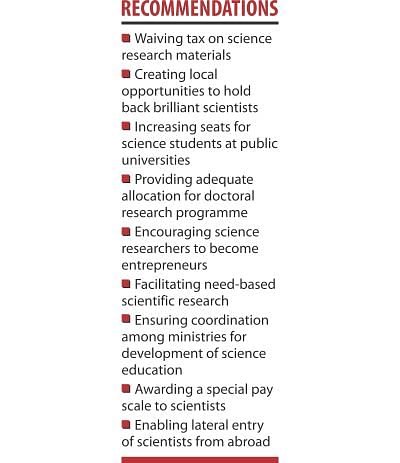Prioritise science action plan

The government has to promote scientific research and popularise science studies by offering rewarding career to students to achieve faster economic growth, said leading scientists and researchers at a discussion yesterday.
The Daily Star organised the discussion at The Daily Star Centre on implementation of the recently-made National Science and Technology Action Plan.
The action plan, gazette-notified last month, contains 11 strategic areas and 246 actions for the development and advancement of science and technology while the National Science and Technology Policy of 1986 was updated last year.
In yesterday's discussion, Prof Ahmed Ismail Mustafa, chairman of Bangladesh Council of Scientific and Industrial Research (BCSIR), said scientists had totally been neglected in Bangladesh although the country's poverty alleviation depended much on their financial wellbeing and autonomy of research institutes.
He said despite being an autonomous body and mandated to invent technologies for industrialisation, the BCSIR had to seek ministerial endorsement for all decisions, even for a scientist's visit abroad.
The interest in science education sharply declined in the country, as commerce studies had become much rewarding, said Prof Ahmed, adding that job assurance and financial recognition could attract brilliant students to science studies.
He emphasised scientific researches based on intellectual competence and not at all by the candidates taken under quota provision.
Referring to Malaysia and Ghana, he said Bangladesh must learn how they had developed through investment in science and technology.
Md Anwar Iqbal, a project implementation expert at Bangladesh Agricultural Research Council, said the council was actually a highly bureaucratic body and was dependent on the ministry for any decision.
Giving an instance, Prof Shamima Choudhury of Dhaka University said Taiwan between 2005 and 2010 had seen phenomenal economic progress with the development of computer chips.
Of the 11 strategic goals, popularising science and technology, and development of human resources for need-based researches were vital and the factors should be pursued on priority basis, she said.
Prof Mohammad Yousuf Ali Mollah, dean of Faculty of Science at Dhaka University, said South Korea without having natural resources had emerged as the world's third largest economy through investment in science and technology.
India is a significant next-door example of how to develop on science and technology, he said.
Science studies must be well-founded in the education system and it must continue uninterrupted despite political feuds and divisions, said Prof Ali.
Dilip Kumar Basak, additional secretary to the Ministry of Science and Technology, said although everybody admitted that science and technology was pivotal to the country's economic development, it is not reflected in the national planning.
Moderator of the discussion Prof Naiyyum Choudhury, former secretary of Bangladesh Academy of Sciences, said after 1998, the National Council for Science and Technology headed by the prime minister met only last year.
Mahfuz Anam, editor and publisher of The Daily Star, said the experience worldwide showed that economic progress was impossible without an integration of scientific research and industrial enterprises.
Lutfur Rahman, former professor of Bangladesh Agricultural University; M Nurul Islam, former professor of Bangladesh University of Engineering and Technology; Prof Zeba Islam Seraj of Dhaka University; Prof Haseena Khan of Dhaka University; Minhaz Anwar, managing director of Better Stories Ltd; and Tahsina Farah Sanam, lecturer at Buet, among others, attended yesterday's discussion.

 For all latest news, follow The Daily Star's Google News channel.
For all latest news, follow The Daily Star's Google News channel. 



Comments